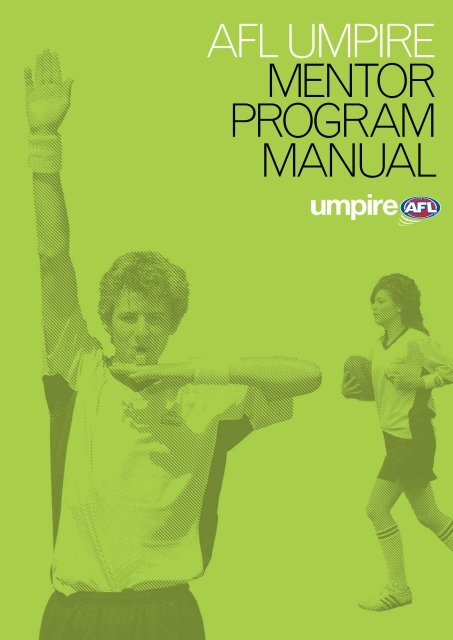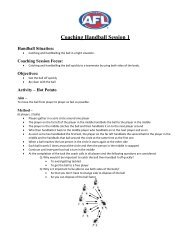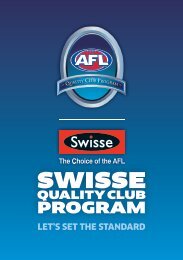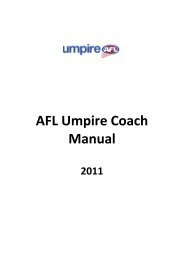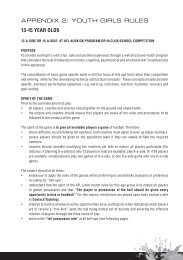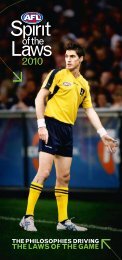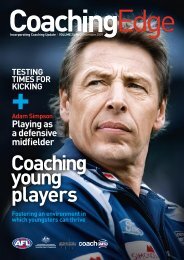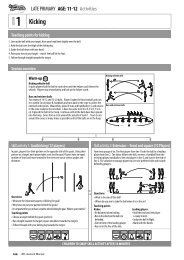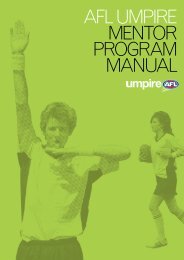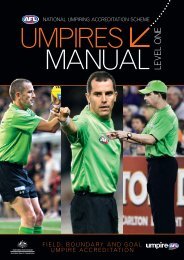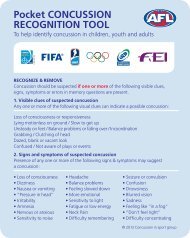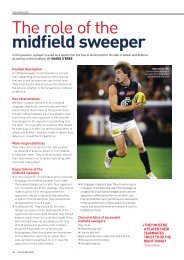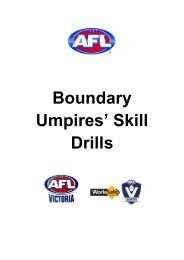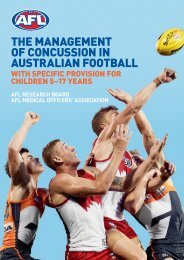AFL UMPIRE MENTOR PROGRAM MANUAL - AFL Community
AFL UMPIRE MENTOR PROGRAM MANUAL - AFL Community
AFL UMPIRE MENTOR PROGRAM MANUAL - AFL Community
Create successful ePaper yourself
Turn your PDF publications into a flip-book with our unique Google optimized e-Paper software.
<strong>AFL</strong> <strong>UMPIRE</strong><br />
<strong>MENTOR</strong><br />
<strong>PROGRAM</strong><br />
<strong>MANUAL</strong><br />
<strong>UMPIRE</strong> <strong>MENTOR</strong> <strong>PROGRAM</strong> <strong>MANUAL</strong> 1
<strong>AFL</strong> <strong>UMPIRE</strong><br />
<strong>MENTOR</strong><br />
<strong>PROGRAM</strong><br />
<strong>MANUAL</strong>
Contents<br />
Overview of the program ...................................................................................................6<br />
Acknowledgements ....................................................................................................7<br />
Objectives of the program ..........................................................................................8<br />
Benefi ts of mentoring to umpiring ....................................................................................9<br />
Benefi ts to the mentor ...........................................................................................9<br />
What does a mentor do? ........................................................................................9<br />
Part 1 – Pre-workshop reading and refl ection................................................................10<br />
Flow chart outlining mentor training program timeline ...............................................11<br />
Remember when ..............................................................................................................12<br />
Identify the challenges faced by the beginning or learning umpire ....................15<br />
We all start somewhere... ..........................................................................................17<br />
My fi rst crack at it .....................................................................................................18<br />
About Mentoring ..............................................................................................................20<br />
What is mentoring? ..............................................................................................20<br />
Pathways to mentoring ....................................................................................................22<br />
Colour recognition .....................................................................................................22<br />
Qualities of a mentor ........................................................................................................23<br />
When can mentoring occur? ....................................................................................25<br />
Match-day mentoring ...............................................................................................26<br />
The S.P.I.R. Method ...................................................................................................27<br />
Entry-point into umpiring ........................................................................................28<br />
Model A for a mentor umpire ...................................................................................29<br />
Model B for a mentor umpire ...................................................................................30<br />
Characteristics of beginning umpires .....................................................................31<br />
Model A approach – gradual development of the learning umpire ......................31<br />
Model B approach – fast-tracking the learning umpire .........................................31<br />
Focus for fi rst season as a fi eld umpire ...................................................................32<br />
Providing match feedback ...............................................................................................33<br />
Communicating with children or teenagers...........................................................33<br />
Some tips about communicating with children and teenagers ...........................33<br />
Body language messages – excercise .....................................................................36<br />
Feedback during and after the game ......................................................................37<br />
Match report and feedback form ....................................................................................38<br />
Feedback exercise – What’s your decision? .................................................................40<br />
Tips for mentoring at a distance .....................................................................................44<br />
Bendigo ACES program ...................................................................................................45<br />
James McEwan ...................................................................................................45<br />
(continued on following page)<br />
4<br />
<strong>UMPIRE</strong> <strong>MENTOR</strong> <strong>PROGRAM</strong> <strong>MANUAL</strong>
Contents<br />
Victoria Mitchell ...................................................................................................45<br />
Patrick Gallagher ..................................................................................................46<br />
Testimonials from mentors ..............................................................................................47<br />
Andrew Whatley – Bendigo ACES Program .....................................................47<br />
Michael Hockley – Bendigo ACES Program ......................................................47<br />
Your own personal goals ..................................................................................................48<br />
Learning umpire questionnaire ..........................................................................49<br />
Appendices .......................................................................................................................50<br />
Appendix A – Providing mentoring support to business colleagues ..............50<br />
Appendix B – Umpire match-day feedback .....................................................51<br />
Appendix C – Umpire mentor program registration form ................................53<br />
Appendix D – Making the transition .................................................................54<br />
Appendix E – Umpiring on the Web ..................................................................55<br />
<strong>UMPIRE</strong> <strong>MENTOR</strong> <strong>PROGRAM</strong> <strong>MANUAL</strong> 5
Overview of the program<br />
The <strong>AFL</strong> Umpire Mentor Program is an initiative of <strong>AFL</strong> Game Development aimed at<br />
improving the recruitment, retention and development of beginning or learning umpires<br />
in under-age, school, local or community-based football competitions. The focus of the<br />
program is to develop individuals as mentors for these umpires – to ease their initiation into<br />
Australian Football and provide the coaching and advice to develop their skills and love<br />
of the game.<br />
The professionalism and depth of umpiring at the elite level of our game is dependent<br />
on suffi cient numbers of enthusiastic and talented umpires working their way through the<br />
ranks to push for selection at the elite level. However, community football also needs to be<br />
supported by competent and enthusiastic umpires who are capable of umpiring at all levels<br />
of the game.<br />
There is no doubt that umpiring can be a very rewarding pastime or career. Our game<br />
is enhanced when umpired by qualifi ed offi cials, so it is vital for the future of Australian<br />
Football that the development of umpires is a priority.<br />
The role of the mentor is crucial in this program. Without the appropriate guidance,<br />
direction and coaching, we risk losing umpires before they get the chance to properly<br />
develop their skills.<br />
Lawrie Woodman<br />
<strong>AFL</strong> National Coaching, Umpiring and Volunteers Manager<br />
6<br />
<strong>UMPIRE</strong> <strong>MENTOR</strong> <strong>PROGRAM</strong> <strong>MANUAL</strong>
Acknowledgements<br />
The <strong>AFL</strong> and the author of this guide would like to thank the following<br />
for their invaluable input and contributions to this resource:<br />
Adrian Panozzo (former <strong>AFL</strong> National Umpiring Development Manager).<br />
Shane Harris (SANFL Director of Umpiring) for his advice about the<br />
South Australian mentor program.<br />
Rod Threlfall (Worksafe VCFL Umpire Development Manager) for his<br />
assistance in updating this program.<br />
Mick Hockley and Andrew Whatley – for their advice and<br />
guidance in relation to the mentor program they established<br />
and run in the Bendigo Umpires’ Association.<br />
The Australian Sports Commission – for allowing use of its<br />
Making Mentors Program.<br />
Contributing umpires – Mathew Nicholls, Mathew Head,<br />
Gavin Dore, Dean Margetts, Ashley Borg, James McEwan,<br />
Patrick Gallagher, Victoria Mitchell, Locky Eccles,<br />
Clinton Markwell, Megan Chudleigh and Adrian Fisher.<br />
Cricket Australia – for allowing use of its Have<br />
A Go Handbook.<br />
Slattery Media Group<br />
<strong>UMPIRE</strong> <strong>MENTOR</strong> <strong>PROGRAM</strong> <strong>MANUAL</strong> 7
Objectives of the program<br />
Those experienced umpires undertaking this professional development<br />
program as a mentor to beginning or learning umpires can expect to develop<br />
the ability to:<br />
Communicate with beginning or learning umpires,<br />
especially teenagers.<br />
Help teach beginning or learning umpires effective<br />
communication strategies for match-day, both verbal and<br />
non-verbal (including appropriate signalling).<br />
Help beginning or learning umpires prepare mentally for<br />
training and for match-day.<br />
Teach beginning or learning umpires how to acquire the<br />
skills they need to operate effectively at their level of the<br />
game and how to improve their skills.<br />
Supervise training or practice sessions.<br />
Observe the performance of beginning or learning umpires<br />
and determine the level of instruction and guidance<br />
they require.<br />
Conduct a post-match analysis and evaluation of the<br />
beginning or learning umpire.<br />
Help a beginning or learning umpire conduct a post-match<br />
analysis and evaluation of his or her own performance.<br />
8<br />
<strong>UMPIRE</strong> <strong>MENTOR</strong> <strong>PROGRAM</strong> <strong>MANUAL</strong>
Benefits of mentoring to umpiring<br />
Can ease the diffi culty and cost of providing structured in-house umpire<br />
training programs.<br />
Mentors are experienced umpires who can use their experience to help<br />
the development of new umpires.<br />
Mentoring a beginning or learning umpire can rejuvenate experienced<br />
umpires and give them a new focus and role within the group.<br />
Umpires who were mentored as beginning or learning umpires are more<br />
likely to do the same when they have substantial experience.<br />
Mentoring beginning or learning umpires can give them the courage to<br />
progress to the next level, thus strengthening the stocks of umpires<br />
in Australian Football.<br />
Acts as a pathway to umpire coach accreditation.<br />
Benefits to the mentor<br />
A renewed enthusiasm and commitment to his or her own umpiring.<br />
An opportunity to share his or her knowledge and skills.<br />
Well-deserved recognition of his or her own skills and expertise.<br />
A chance to learn something new.<br />
Promotion of lifelong learning through meaningful relationships.<br />
Benefi ts to the beginning or learning umpire.<br />
Increased confi dence and motivation.<br />
Constructive feedback on performance.<br />
Assistance in translating theory into practice.<br />
Novice provided with the chance to ‘network’ and enhance<br />
career prospects.<br />
Can minimise the diffi culties of attending a structured training course, in<br />
terms of cost, time, travel, etc.<br />
What does a mentor do?<br />
Mentors can play a wide variety of roles. Some of these include:<br />
Developing the umpires’ knowledge and skills.<br />
Being a role model for a beginning or learning umpire.<br />
Helping to build the confi dence of the umpire they are working with.<br />
Being a resource to the umpire they are mentoring – either sharing their<br />
own knowledge or directing the umpire to other sources of information.<br />
Challenging and questioning the beginning or learning umpire to refl ect<br />
on his or her current practice.<br />
Being involved in assessing the umpire for a qualifi cation.<br />
Providing instructions to other people who can help.<br />
Developing greater self-awareness as an umpire (empowerment).<br />
<strong>UMPIRE</strong> <strong>MENTOR</strong> <strong>PROGRAM</strong> <strong>MANUAL</strong> 9
Part 1: Pre-workshop reading and reflection<br />
The purpose of this phase of the training program is to help you focus on the aspects of<br />
umpiring you will have an impact on as a mentor. You will be asked to read and respond to a<br />
range of recollections from umpires at various levels of the game.<br />
Your responses will make up the fi rst section of the formal training process when you will<br />
work through your reactions with other mentors in the program.<br />
This section must be completed by participants BEFORE the Mentor Training Workshop.<br />
Your responses here will make up the fi rst section of the workshop, so please ensure you<br />
give them some thought and complete them before the day of the workshop.<br />
10<br />
<strong>UMPIRE</strong> <strong>MENTOR</strong> <strong>PROGRAM</strong> <strong>MANUAL</strong>
<strong>UMPIRE</strong> <strong>MENTOR</strong> <strong>PROGRAM</strong> <strong>MANUAL</strong> 11
Remember when...<br />
The following is an actual account of a young umpire’s fi rst foray into the world of Australian<br />
Football umpiring. The umpire is now an <strong>AFL</strong> fi eld umpire and has offi ciated in more than<br />
50 games.<br />
“I vividly recall being petrifi ed of going out there each Sunday knowing I was going to be abused and<br />
being unsure of what I was really doing. Within two weeks I had gone from watching my mates play<br />
footy to being a fi eld umpire. It all happened very quickly. I started in the Doncaster Juniors in the<br />
under-12s. My fi rst game seemed to go pretty well, I think it was just the adrenalin running through<br />
my body and my footy background that got me through. I had no reason not to feel confi dent about<br />
the next week. From the moment I got to the ground in Bundoora I started to feel uneasy. I was<br />
completely alone, there were no umpires’ rooms, no one to point me in any direction. I paid a free<br />
kick early in the game and heard a call from the crowd abusing me in some way. It was an off-thecuff<br />
comment that I took offence too. I then paid another free kick and heard some more heckling.<br />
I really started to feel conscious about paying free kicks. At quarter-time as the parents walked from<br />
their viewing side of the ground through the middle of the ground to hear the coaches, I remember<br />
one parent making some comment about me and everyone else in the area laughing at what he had<br />
said. I felt really embarrassed and ashamed. In the second quarter, a player should have got a free<br />
kick but I did nothing about it.<br />
Instead of being abused by the crowd, I heard nothing, no reaction. “This is better,” I thought to<br />
myself. From then on I decided the best way to not be abused and hassled was not to pay free<br />
kicks. A player would get ridden into the ground, which was so obviously a push in the back. “You<br />
jumped forward,” I would justify to myself. Still no abuse. This went on for weeks. I was paying<br />
maybe one or two free kicks a game. This went on until I had a game, still in the under-12s when I<br />
was being watched by an umpires’ observer. Despite it being a spiteful game, I was still refusing to<br />
pay free kicks so as not to draw attention to myself. Each game I did, I was hoping that it would end<br />
quickly and I could get out of there. During the week, the umpires’ observer spoke to my father and<br />
recommended that maybe umpiring was not right for me. Over the weeks he had received letters<br />
from coaches of the teams viewing their concerns. My dad asked about paying free kicks and I<br />
explained that I was too scared to pay them because they drew attention to me. We then devised<br />
a plan. We looked at <strong>AFL</strong> games and saw that in most games about 30 free kicks would be paid. I<br />
would look at starting off with trying to pay fi ve free kicks a quarter. No matter what anyone said, I<br />
would pay this amount or more. My dad would come out to me at each break and tell me how many<br />
I paid. I slowly gained some confi dence in paying free kicks. I was then handling games well. I then<br />
wanted to umpire two games a day to try and get it right. In the matter of a couple of weeks, I went<br />
from totally despising being out there to not being able to get enough umpiring. There is no doubt<br />
that the earliest part of my umpiring career was the hardest to get through. Once I got through those<br />
early stages I was fi ne.”<br />
Field umpire Matthew Head joined the <strong>AFL</strong> panel in 2001. At the end of the 2007 season,<br />
Matthew had officiated in 124 senior <strong>AFL</strong> games.<br />
12<br />
<strong>UMPIRE</strong> <strong>MENTOR</strong> <strong>PROGRAM</strong> <strong>MANUAL</strong>
“I know when I umpired my fi rst football game, I was verbally attacked by a woman brandishing an<br />
umbrella on the boundary line, and this was before I had actually walked on to the ground to umpire<br />
the game. So it was a rude awakening to the sport. Experience is the key to umpiring and yet it<br />
takes time to acquire this, which can frustrate you when you are trying to rise through the ranks.<br />
Exposure to different situations helps you develop that instinctual reaction when umpiring games.<br />
I was fortunate enough to be coached early on by Kevin Mitchell, who instilled in me the professional<br />
aspects of umpiring, on and off the fi eld – the way you dressed and presented yourself at training<br />
and on game day. Kevin made sure that I was exposed to as much football as possible, at both<br />
junior and senior level, so that I developed the necessary skills to go on and umpire at <strong>AFL</strong>/VFL<br />
level. Kevin had just arrived at Dandenong Juniors after a very successful career as a boundary<br />
umpire with the VFL, umpiring in nine Grand Finals, so I always listened intently to what he had to<br />
say. There is also no doubt that as a young umpire you watch the more senior guys and learn from<br />
them and how they react to certain situations, and that was the case through my career.<br />
I guess when you fi rst start out umpiring, it can feel like everyone knows you are new to the job<br />
and are quick to expose or take advantage of that. For example, Players may continually question<br />
your decisions, even though you are probably getting most of them right. However, they see it as an<br />
opportunity to perhaps pressure you into giving them one their way. They will try to distract you to<br />
allow their teammates the opportunity to block, hold or push their opponents.<br />
Players can also intimidate you physically just by their size, and that can be very uncomfortable.<br />
Coaches often pick up on the young umpire and pressure him from the sideline,<br />
constantly criticising and alerting him to the mistakes he is making. It is important that as a<br />
new umpire you try and sell yourself by being positive and strong, blowing the whistle sharply<br />
and signalling with conviction.”<br />
Bryan Sheehan umpired 363 <strong>AFL</strong> games at the elite level from 1984-2003, including six Grand Finals,<br />
and now coaches and mentors <strong>AFL</strong> umpires.<br />
I fi rst learned about umpiring at school, before being mentored at the Moorabbin Saints Junior<br />
Football League. As a fi rst-year umpire, having a mentor was good because there was always<br />
someone to provide support and tips on how to improve and become a better umpire. Having a<br />
mentor also helped build my confi dence.<br />
Megan Chudleigh, 15, Moorabbin Saints Junior Football League<br />
After three years of mentoring young umpires, I fi nd it very rewarding when they are able to stand on<br />
their own two feet and do what you have taught them.<br />
Most of our fi rst-year umpires start in modifi ed rules games, which is another challenge as these<br />
rules can sometimes be a little confusing and diffi cult for a young umpire to comprehend. I enjoy<br />
being on the ground with new umpires, as I am able to mentor them on the spot, rather than have to<br />
wait until the end of a quarter.<br />
A great highlight for me was that one of the young girls I mentored, Alexandria Anthony, was selected<br />
to umpire a half-time grid game at the 2006 <strong>AFL</strong> Grand Final. That made me extremely proud.<br />
Mentoring is very rewarding and keeps you in touch with the many wonderful young people who have<br />
so much to offer.<br />
Adrian Fisher, umpire’s advisor, Moorabbin Saints Junior Football League<br />
<strong>UMPIRE</strong> <strong>MENTOR</strong> <strong>PROGRAM</strong> <strong>MANUAL</strong> 13
I have been involved in umpiring for 38 years. The reason of late for my longevity in the game has<br />
been the introduction of the mentor program in which I was asked to be a part of last year. I was<br />
assigned three young aspiring fi eld umpires taking the whistle for the fi rst time. I quickly found these<br />
young men were a delight to work with, and the bond we have established can be attributed to the<br />
program.<br />
From day one we all sat down as a team and discussed what our goals were and where the three<br />
wanted to go with their umpiring. Not surprisingly, all three expressed a great desire to umpire<br />
football to the best of their ability and ultimately at the highest possible level.<br />
This encouraged me to play a fundamental role in their development, not just as umpires, but also as<br />
boys turning into men.<br />
Mentoring has proven to be a rewarding experience for me personally, as it keeps me involved in<br />
the game. More to the point, the mentor program opens new doors for young umpires to achieve<br />
their dreams.<br />
Locky Eccles, Warrnambool and District Football Umpires Association<br />
For a young person – not just as an aspiring umpire – but also as a person establishing him or<br />
herself as an individual, the mentor program is a major factor in helping me develop, from a nervous<br />
and apprehensive fi rst-year fi eld umpire into a confi dent, motivated and knowledgeable young adult.<br />
The skills I learned from my mentor are primarily ones which only experience can bring. I have<br />
developed skills that will be bound to me for life.<br />
The mentor program has given me the capacity to endure, persist and succeed, but more importantly,<br />
to enjoy the work I put in.<br />
Having the support of a mentor on match-day, at training and after hours has allowed me to show my<br />
ability in an uncompetitive setting.<br />
It has also helped motivate me to pursue bigger dreams.<br />
Clinton Markwell, Warrnambool<br />
14<br />
<strong>UMPIRE</strong> <strong>MENTOR</strong> <strong>PROGRAM</strong> <strong>MANUAL</strong>
Identify the challenges faced by the beginning or learning umpire<br />
Having read the accounts by a range of umpires dealing with their fi rst few<br />
games of Australian Football, what would you identify as the issues that<br />
initially made it a diffi cult job?<br />
<strong>UMPIRE</strong> <strong>MENTOR</strong> <strong>PROGRAM</strong> <strong>MANUAL</strong> 15
In each umpire’s account of his early days, what things encouraged him<br />
to stick at it?<br />
“Glenn James was my mentor when I fi rst got on the list. We trained from his place pre-season until<br />
he retired. The main things he impressed on me were: (1) to make each training session a quality<br />
one; (2) incorporate a balanced lifestyle with umpiring, i.e. family and work; (3) watch your diet! He<br />
also taught me a lot about tolerance, as being an umpire requires you to have a thick hide and focus<br />
on the things that are important to you in your job and ignore the idiots around you. The comments<br />
people threw at him as we ran around where we trained really shocked me, but this was 23 years ago!<br />
Field umpire Gavin Dore umpired 302 senior <strong>AFL</strong> matches including the 1996 <strong>AFL</strong> Grand Final.<br />
16<br />
<strong>UMPIRE</strong> <strong>MENTOR</strong> <strong>PROGRAM</strong> <strong>MANUAL</strong>
We all start somewhere...<br />
Read the following account of another <strong>AFL</strong> fi eld umpire’s fi rst foray into umpiring.<br />
It is a refreshing reminder that no matter what level you eventually achieve as an umpire,<br />
you have to start somewhere.<br />
I remember my fi rst game in 1992. It was a Sunday morning at Moore Park in Reservoir for an under-<br />
13s practice match between West Preston and Reservoir Colts. I’d missed out on the under-9s and<br />
under-10s games, but assured the umpires’ coach that I could do an under-13s game. He wasn’t so<br />
sure, but gave me a go anyway.<br />
I’d been out shopping during the week to get some white boots – not the easiest things to fi nd – and<br />
had gone away with some moulded-sole adidas boots that were three or four sizes too big for me.<br />
A little cotton wool in the ends would fi x that, or that’s what I thought! I was dressed in my new white<br />
kit and strode out on to the rock-hard ground ready and raring to go.<br />
Actually, I wasn’t ready at all. Being the chubby little 14-year-old that I was, I had absolutely NO<br />
fi tness. I didn’t have a clue about where to run or even what a free kick was, but I’d played for<br />
a couple of years and fi gured I could get through on that experience. I’d had no coaching, no<br />
instructions. I hadn’t even seen a rule book! I don’t even want to think about how I bounced the ball.<br />
By 15 minutes into the fi rst quarter, the chaffi ng on my thighs was so bad that I could hardly walk,<br />
let alone run! People were screaming at me and abusing me and my feet were killing me. I shouldn’t<br />
have worn those brand new boots; runners would have been a much better option, but I thought I<br />
had to wear boots. Well, nobody told me otherwise! It was hot, and I was struggling – big time!<br />
I’m still not sure how I made it through that game, but I fronted up again the next weekend and<br />
things just went from there.<br />
Field umpire Mathew Nicholls was promoted to the <strong>AFL</strong> senior panel and umpired his first game in round<br />
two of the 2003 season. He had umpired 65 games at the end of the 2007 season.<br />
On the next page you will be given a section to record some of your earliest moments as an<br />
umpire in Australian Football. A mentor should be able to empathise with a beginning or<br />
learning umpire and share with him or her what it was like as a new umpire.<br />
<strong>UMPIRE</strong> <strong>MENTOR</strong> <strong>PROGRAM</strong> <strong>MANUAL</strong> 17
My first crack at it<br />
As a mentor, your ability to understand what emotions, aspirations, fears, challenges and<br />
goals a beginning or learning umpire might be confronting will be crucial. The longer you<br />
have been umpiring, the further back you will have to go to recall those early days – although<br />
everyone will have one or two of those moments that will never leave them.<br />
As an umpire rises through the ranks, he or she becomes a new umpire to some extent<br />
at each level of the game and there are new challenges to confront. Before refl ecting on one<br />
or two of your earliest memories, think back to what Mathew Head, Bryan Sheehan and<br />
Mathew Nichols wrote about their early experiences.<br />
Take time now, in the space provided, to recount two or three of your early memories as an<br />
umpire that might be useful when working with a beginning or learning umpire. They may<br />
not necessarily be from your very fi rst matches, but from your fi rst grand fi nal – as long as<br />
the anecdote would have some value to another umpire who wants to learn more about the<br />
game and develop his or her skills.<br />
18<br />
<strong>UMPIRE</strong> <strong>MENTOR</strong> <strong>PROGRAM</strong> <strong>MANUAL</strong>
<strong>UMPIRE</strong> <strong>MENTOR</strong> <strong>PROGRAM</strong> <strong>MANUAL</strong> 19
About Mentoring<br />
Extractions in this section adapted from Australian Sports Commission<br />
– Making Mentors, 2002.<br />
WHAT IS <strong>MENTOR</strong>ING?<br />
Mentoring is nothing new – particularly in sport. We have all turned to an experienced<br />
friend or colleague for advice, especially when we are learning something new or are facing<br />
a new challenge.<br />
Most sportspeople and many coaches and offi cials would freely admit they have sought<br />
the advice of an experienced player, coach or offi cial at some point in their career.<br />
What is new, however, is the concept of using a mentor in a more structured way to help<br />
guide you through a challenging learning process.<br />
Think back to your earliest games as an umpire. What were some of the immediate<br />
challenges you faced? Managing the players? The abuse from the crowd? Aggression?<br />
Knowing the rules? Being fi t enough to do your job as an umpire? The pressure of getting<br />
it right in the heat of the moment? Those times when you got it wrong?<br />
Have a quick think about the immediate challenges you faced as a fl edgling umpire, and<br />
list them below.<br />
20<br />
<strong>UMPIRE</strong> <strong>MENTOR</strong> <strong>PROGRAM</strong> <strong>MANUAL</strong>
Mentoring is a highly effective way for new umpires to learn the ‘art’ of their role and apply<br />
theory they may have learnt in the classroom or through independent study. Mentors can<br />
bring life to a theoretical concept, demonstrate practical offi ciating skills, be a sounding<br />
board for problems, help you to identify weaknesses or be a source of motivation and<br />
a reminder that you are doing a great job!<br />
Mentoring relationships can be formally structured, with mentors assigned to umpires,<br />
or they can grow out of a chance encounter with a like-minded umpire and remain very<br />
informal. They can be equally as useful for a new umpire just starting out in the sport as<br />
for an elite umpire with signifi cant experience. It doesn’t matter what form a mentoring<br />
relationship takes, as long as the umpire and the mentor see value in the relationship and<br />
it helps both to develop and become better at their jobs.<br />
“Mentoring is a process rather than an event; mentors must see themselves as managers<br />
of a process rather than passing on knowledge.”<br />
Galvin, 1998<br />
<strong>UMPIRE</strong> <strong>MENTOR</strong> <strong>PROGRAM</strong> <strong>MANUAL</strong> 21
Pathways to Mentoring<br />
Every mentoring scenario will take a different shape, as every umpire you will work with<br />
will have different skills and attributes and display differing levels of competency. The<br />
environment in which the mentoring takes place will also be a signifi cant factor.<br />
Mentoring will take place at all different levels of the game and thus a mentoring approach<br />
needs to be adapted to the level at which you are working.<br />
The following pages will outline some pathways to umpiring that a junior umpire might<br />
take and the role of the mentor in this process.<br />
Colour recognition<br />
It is worth discussing the issue of wearing a different colour with the new umpire you are<br />
mentoring. Identifying him or her as a learner can have a range of different responses –<br />
much in the same way as placing ‘L’ or ‘P’ plates in a car. The umpires from the Bendigo<br />
ACES program have given almost unanimous support for wearing a different colour and<br />
emphasise that supporters, coaches and players all know they are learning the role of central<br />
umpiring and therefore go a little easier on them.<br />
An older or adult umpire might fi nd this especially the case, as most supporters would<br />
expect an adult to be an experienced umpire, not a learner, and feel they are fair game for<br />
abuse. Again, evidence out of the Bendigo ACES program suggests adult learners would<br />
prefer to wear an identifying coloured shirt.<br />
22<br />
<strong>UMPIRE</strong> <strong>MENTOR</strong> <strong>PROGRAM</strong> <strong>MANUAL</strong>
Qualities of a Mentor<br />
Mentors come in all shapes and sizes, but to be effective they need to have appropriate<br />
knowledge, skills and attitudes. Knowledge may include their understanding of technical<br />
umpiring matters such as the rules and how they are interpreted, understanding people and<br />
what makes them tick (especially in pressure situations during a game), their understanding<br />
of the umpiring process, their political awareness, etc. Skills might include honesty,<br />
empathy, planning, goal setting, time/people/process management, and the ability to<br />
communicate one-on-one with individuals from a range of backgrounds. Attitudes might<br />
relate to the process of mentoring, philosophy towards umpiring, attitudes about the league<br />
or group they work within, as well as their general outlook on life.<br />
Some of the qualities mentors should possess are:<br />
• An ability to focus on the umpiring process, rather than on the umpire’s performance.<br />
• A willingness to assist another umpire’s development and growth and create a positive<br />
environment for learning.<br />
• Exemplary communication and feedback skills (especially with constructive criticism of<br />
the beginning or learning umpire’s performance).<br />
• Up-to-date technical skills and experience as an umpire – preferably they are umpiring<br />
themselves or were recently an umpire with substantial experience.<br />
• Trustworthiness and an ability to maintain confi dences. The beginning or learning<br />
umpire must feel confi dent he or she can talk openly to the mentor.<br />
• An openness to new ideas. Mentors should learn more about themselves and about<br />
umpiring through the process of umpiring. A mentor should never feel awkward about<br />
having to clarify his or her understanding of the technical side of umpiring so as to<br />
advise the beginning or learning umpire.<br />
• A strong network of umpiring and football contacts.<br />
• Suffi cient time and inclination to commit to the mentoring relationship and be easily<br />
accessible. A beginning or learning umpire must feel free to phone or email with a<br />
question and get a friendly and timely response from their mentor. The beginning or<br />
learning umpire should never feel he or she is taking the time of an unwilling mentor.<br />
• Ability to handle confl ict situations.<br />
<strong>UMPIRE</strong> <strong>MENTOR</strong> <strong>PROGRAM</strong> <strong>MANUAL</strong> 23
Thinking specifi cally about those who have had an impact on you as an umpire, in business<br />
or in your personal life, try to identify some of the qualities of that person as a mentor.<br />
This person will ideally have inspired you to develop a talent and showed an interest in you.<br />
What are the two most signifi cant qualities in this person that you admired and that helped<br />
you to learn?<br />
What are some of the qualities you feel you might be able to tap into to help you operate as a<br />
successful mentor to young umpires? Refer to the previous pages, look through the qualities<br />
of a mentor and indicate those on this list that you feel are your real strengths. Add any<br />
others you feel you possess.<br />
Are there any obvious weaknesses you feel you have as a mentor? Self-awareness is an<br />
important skill as a mentor and helps you focus on improving those aspects of yourself that<br />
might make you a better mentor.<br />
24<br />
<strong>UMPIRE</strong> <strong>MENTOR</strong> <strong>PROGRAM</strong> <strong>MANUAL</strong>
When can mentoring occur?<br />
Mentoring can occur at any stage of the learning and accreditation process. It can become<br />
the key learning vehicle for umpires undertaking accreditation; it can be a component of<br />
the umpiring practice requirements, or it can be an informal relationship that is entirely<br />
independent of the accreditation process.<br />
Some other opportunities for mentoring include:<br />
At training – A mentor can be invited to attend some of the umpire’s<br />
training sessions or he or she may even take part in the training session<br />
to give the umpire being mentored a chance to see him or her in action<br />
on the training track.<br />
At matches – However, you must always consider the effect that<br />
any mentoring will have on the performance of the umpire. Perhaps<br />
scheduling some time with a mentor after a game to review the umpire’s<br />
performance is the best compromise.<br />
Consider the possible positive or negative impacts on an umpire if you give him or her<br />
advice at each break.<br />
<strong>UMPIRE</strong> <strong>MENTOR</strong> <strong>PROGRAM</strong> <strong>MANUAL</strong> 25
Video analysis – It may be diffi cult to have a mentor attend a practice<br />
session or even a match for that matter, particularly in rural areas. A<br />
good alternative is to videotape the practice session or match and send<br />
the tape to the mentor for comment. It is also important in this scenario<br />
to provide the mentor with some background information about the<br />
practice session or the match that is the subject of the videotape. It<br />
might also be an idea to focus on a particular goal for the session for<br />
the mentor to comment on specifi cally or to focus on. Eg.: “I was really<br />
looking at my set kick management in this game – particularly in lining<br />
up players shooting for goal. I wanted to make sure my instructions were<br />
clear to the player taking the kick as well as to the other players around<br />
the mark.” The video process should be a catalyst for discussion and<br />
feedback and should ideally have some form of written feedback for the<br />
umpire being viewed. A feedback form, such as one on page 38 in this<br />
training manual, is a good idea.<br />
Planning of sessions/seasons – Having a mentor comment on plans<br />
can help to identify any shortcomings and enable coaches to build better<br />
plans for the future. Goal setting as part of the mentoring process will be<br />
dealt with later in this training manual.<br />
Match-day mentoring<br />
Many of the beginning or learning umpires you will work with as a mentor will be between<br />
the ages of 12 and 16, although a beginning or learning umpire may be any age. Similarly,<br />
mentoring need not necessarily be only for entry-level umpires. Even <strong>AFL</strong> umpires require<br />
mentors so they can be at their best.<br />
When undertaking your mentor’s role on match-day, a structured approach is vital. On the<br />
following page is a method for coaching taken from Cricket Australia’s publication, Have a<br />
Go Handbook.<br />
26<br />
<strong>UMPIRE</strong> <strong>MENTOR</strong> <strong>PROGRAM</strong> <strong>MANUAL</strong>
S<br />
P<br />
I<br />
R<br />
The S.P.I.R. Method<br />
When teaching a new skill to an umpire, the S.P.I.R. method offers an approach that may be<br />
adopted by the mentor. It has been proven to be an effective way to assist children learn and<br />
develop new skills.<br />
Take some time and fill in your own examples in the right-hand column.<br />
HOW (demonstrate)<br />
Name the skill you will be focusing on with the umpire.<br />
Show how to execute the entire skill.<br />
While making instructional points to the umpire, show<br />
them again.<br />
Make sure you try to “keep it simple” and give them as<br />
few points as possible – perhaps keeping it at under<br />
three.<br />
Give them a chance to ask questions.<br />
Finally demonstrate one more time, asking the umpire<br />
to again watch closely.<br />
RACTISE<br />
Get the umpire to practise the new skill immediately.<br />
Children will copy what they have been shown.<br />
Get them to demonstrate the whole skill fi rst.<br />
If required, break the skill into individual parts.<br />
NSTRUCT (or correct errors)<br />
Observe the umpire either during practice or during a<br />
match.<br />
Repeat the key point (if this is done during a match,<br />
perhaps wait until a quarter break).<br />
Provide further instruction if required.<br />
EWARD<br />
Praise good effort as well as good results. Remember<br />
that while learning, the beginning or learning umpire<br />
will not always get it right. Look at ways of pulling<br />
positives out of the effort he or she has shown.<br />
Show pleasure in their efforts. This will come naturally,<br />
no doubt, as you see the impact you are having as a<br />
mentor, but always keep this as an emphasis.<br />
If you are working with a range of umpires, make sure<br />
you are recognising them all. Sometimes we fi nd it<br />
easy to forget elite performers, or we struggle with<br />
those who are having real diffi culties. Make sure these<br />
umpires are always recognised.<br />
EXAMPLES<br />
Hand shake<br />
Building rapport and respect<br />
Positive body language<br />
<strong>UMPIRE</strong> <strong>MENTOR</strong> <strong>PROGRAM</strong> <strong>MANUAL</strong> 27
28<br />
<strong>UMPIRE</strong> <strong>MENTOR</strong> <strong>PROGRAM</strong> <strong>MANUAL</strong>
A ‘staged’ approach to mentoring<br />
Each experience with a ‘learner’ umpire will be different.<br />
As a result taking a ‘staged’ approach will allow you to<br />
pace the types to experiences and methods you will use<br />
to develop an umpire that you are mentoring. Some times<br />
an umpire may advance through one or more stages and<br />
then revert back depending on the level of competence<br />
and the standard of match.<br />
Stage 1 – The first stage involves the learner umpire<br />
‘shadowing’ you. This gives them a chance to be out there<br />
seeing and experiencing first hand the game from the<br />
umpires perspective. From time to time you should make<br />
comments that provide additional insights into the role,<br />
skills and responsibilities of an umpire during the match.<br />
Breaks in play and intervals between quarters are a time<br />
when you should encourage the learner to ask questions<br />
and explain to you what they are ‘picking up’ in terms<br />
of the basic skills of umpiring including communication,<br />
positioning, decision making, signals and cooperation<br />
with players, offi cials and other umpires.<br />
Stage 2 – Providing the umpire with practical match<br />
experience is the key to the next stage. Allowing the umpire<br />
to do things like – blow the whistle and call in the captains,<br />
toss the coin, throw the ball up after a goal, give an all clear<br />
after a score or pay a mark are some of the ways in which<br />
the umpire can develop confidence, communication and<br />
decision making skills. Many of the ‘in game’ skills are best<br />
done during the middle of a quarter, and you can use your<br />
judgement on which and how many that you also introduce<br />
the concept of the ‘over rule’ which is done in a supportive<br />
and corrective way so the game is umpire fairly and the<br />
learner umpire and get immediate feedback on what they<br />
are doing well or can improve upon.<br />
MODEL A<br />
STEP ONE<br />
Shadow the mentor on the<br />
ground.<br />
GAME TWO<br />
Take only specific decisions<br />
in the game.<br />
GAME THREE<br />
Umpire all decisions in parts<br />
of the game.<br />
GAME FOUR<br />
Umpire whole quarters,<br />
building up to a whole<br />
match.<br />
GAME FIVE<br />
Umpire whole quarters,<br />
building up to a whole<br />
match.<br />
GAME SIX<br />
Umpire whole quarters,<br />
building up to a whole<br />
match.<br />
GAME SEVEN<br />
Progress to higher grade<br />
competition.<br />
<strong>UMPIRE</strong> <strong>MENTOR</strong> <strong>PROGRAM</strong> <strong>MANUAL</strong> 29
Be aware that the learner umpire is trying to process<br />
many things, often for the first time, so when and how<br />
you provide feedback and ask questions is important.<br />
Clear breaks in play (after a goal) and the time between<br />
quarters are good examples.<br />
Stage 3 – As you gain a greater understanding of<br />
the learner umpires abilities you can begin to provide<br />
them with greater exposure to periods of the match<br />
where they are in control. You may even consider<br />
them starting quarters, and completing paperwork.<br />
At any time you may utilise strategies described in<br />
earlier stages to support the umpires development.<br />
Stage 4 – By this stage the umpire is controlling<br />
extensive periods of the match. You may even be<br />
observing from the sidelines. Again there is flexibility<br />
in your approach. An example of this may be when an<br />
umpire advances to a higher standard or experiences<br />
a challenging period during a match. At any time you<br />
may use strategies from earlier stages to help support<br />
and encourage the umpires development.<br />
MODEL B<br />
GAME ONE<br />
Shadow the mentor during<br />
first quarter.<br />
GAME ONE<br />
Take control of second quarter<br />
in the game.<br />
GAME ONE<br />
Take control of the final quarter.<br />
GAME TWO<br />
Move to one-umpire system<br />
and umpire whole match.<br />
GAME THREE<br />
Progress to higher grade<br />
competition.<br />
30<br />
<strong>UMPIRE</strong> <strong>MENTOR</strong> <strong>PROGRAM</strong> <strong>MANUAL</strong>
Characteristics of beginning umpires<br />
On the previous two pages, there are two potential pathways for a mentor umpire.<br />
Review the two models and list the characteristics you would be looking for when adopting<br />
either model. List also the characteristics of the mentor umpire you would be looking for<br />
when following either model.<br />
Model A approach – gradual development of the learning umpire<br />
The characteristics I would be observing to consider a gradual development plan with a<br />
learning umpire are:<br />
Model B approach – fast-tracking the learning umpire<br />
The characteristics I would ideally be observing to consider fast-tracking a learning<br />
umpire are:<br />
<strong>UMPIRE</strong> <strong>MENTOR</strong> <strong>PROGRAM</strong> <strong>MANUAL</strong> 31
Focus for first season as a field umpire<br />
The speed at which the new umpire progresses will vary from individual to individual<br />
and every mentor will need to exercise his or her judgement about this process. The stage at<br />
which the new umpire is ready to take a full game might come very quickly or it might<br />
take many games.<br />
This process is intended to be tailored by you as the mentor. Use your discretion and<br />
apply the process to be outlined in the way you feel best fi ts the new umpire. Keep<br />
in mind their age, maturity, experience and personality.<br />
As a starting point, it is a good idea to get to know them personally so they feel<br />
comfortable with you. On page 53 (Appendix C) there is a simple form you may use<br />
to help build this rapport. It will also be a useful resource as you learn more about the<br />
umpire. It will be especially useful if you are mentoring a range of umpires. Perhaps you<br />
might be working with four at one time. A ratio of 1:4 is generally regarded as appropriate.<br />
If you take on more than this, you might fi nd the workload too onerous.<br />
32<br />
<strong>UMPIRE</strong> <strong>MENTOR</strong> <strong>PROGRAM</strong> <strong>MANUAL</strong>
Providing match feedback<br />
Some important advice on communication<br />
Communicating with children or teenagers<br />
As much of your role as a mentor will require you to communicate with teenagers, it is<br />
appropriate to examine some of the more important aspects of this. We will examine some of<br />
the more general rules about communication – those that apply to all situations, those that<br />
apply to children and those that apply to adults. The following section should help shape the<br />
way you communicate with the beginning or learning umpire, during the match and after<br />
matches or at training, both verbally and in writing. Remember, communication is a skill<br />
and, like all other skills, requires practise and refl ection to improve.<br />
Some tips about communicating with children<br />
and teenagers:<br />
Draw young people out to speak about the things on their minds. If the<br />
person you are mentoring seems to be a little upset about a particular<br />
match or aspect of a match, work on getting him or her to verbalise what<br />
is going through his or her head.<br />
You can ‘prime the pump’ by talking with them about their favourite<br />
foods, toys, movies, video games, etc. Basically, this means starting with<br />
something a little more informal, then moving on to the aspect of the<br />
game or performance you wish to address.<br />
Verbally refl ect on the emotions of a young person before giving<br />
in to your need to teach him or her something. You can do this by<br />
paraphrasing – repeating what they have said, but in your own words –<br />
to ensure you have got the message straight.<br />
Adults are constantly making the error of educating young people when<br />
that person expresses pain. “I had an absolute shocker today – I don’t<br />
think I can make it as an umpire” is often met with, “You did fi ne” and<br />
the child may be left to feel all alone with what could become a problem<br />
for them. It is important to deal with the negative feelings of poor<br />
performance, because he or she will have bad days even if they make it<br />
to the top.<br />
Lower yourself physically to a young person’s level by sitting down,<br />
bending down or sitting on the fl oor.<br />
It may have been months since any adult has joined the young person<br />
on his or her own level. Sit with them on the bench after a game rather<br />
than stand over them and talk down to them.<br />
Tell the young umpire anecdotes about your past and/or present<br />
experience as an umpire.<br />
<strong>UMPIRE</strong> <strong>MENTOR</strong> <strong>PROGRAM</strong> <strong>MANUAL</strong> 33
You can make up the stories, but it is preferable to draw them from your<br />
own experience, especially as a new umpire. This manual will be a great<br />
resource for you in the types of anecdotes to share with a developing<br />
umpire. There are anecdotes from a range of umpires at a range of levels,<br />
but perhaps the most important and useful ones will be those from your<br />
own experience. The ones you have recounted earlier in this manual will<br />
be useful in the right circumstances!<br />
Act on the promises that you make the beginning or learning umpire.<br />
Children and teenagers are usually more hurt than adults by broken promises. Ironically,<br />
many people treat their promises to children and teenagers as less important than their<br />
promises to adults. Remember, as a mentor, you need to follow up with the umpire you are<br />
mentoring. If this means you can’t promise time, then don’t. In your own umpiring network,<br />
you may well have other people you can refer the beginning or learning umpire to for extra<br />
support.<br />
Master the art of Socratic questioning. This means that instead of<br />
expressing facts or lecturing, you ask a question to stimulate the young<br />
person’s own reasoning process. Socratic questioning opens up a place<br />
in a person’s mind for the answer to be remembered. For example, you<br />
could ask, “How do you think you could have managed that set kick in<br />
front of goal a bit better?” instead of telling the umpire what to do.<br />
Professor Albert Mehrabian has pioneered the understanding of communications since<br />
the 1960s. He received his Ph.D. from Clark University in the US and in l964 started<br />
an extended career of teaching and research at the University of California, Los Angeles.<br />
He devotes his time to research, writing and consulting as Professor Emeritus of<br />
Psychology, UCLA.<br />
Aside from his many and various other fascinating works, Mehrabian established this classic<br />
statistic for the effectiveness of spoken communications:<br />
7 per cent of meaning is in the words that are spoken.<br />
38 per cent of meaning is paralinguistic (the way that the words are said).<br />
55 per cent of meaning is in facial expression.<br />
34<br />
<strong>UMPIRE</strong> <strong>MENTOR</strong> <strong>PROGRAM</strong> <strong>MANUAL</strong>
Mehrabian’s model has become one of the most widely referenced statistic in<br />
communications. The model is particularly useful in illustrating the importance of<br />
considering factors other than words alone when trying to convey (as the speaker)<br />
or interpret (as the listener) meaning. Style, expression, tone, facial expression and<br />
body language account for 93 per cent of meaning. Keep this in mind when you are<br />
communicating with an umpire over the phone or even via email, which we will<br />
address soon.<br />
The understanding of how to convey (when speaking) and interpret (when listening)<br />
meaning is essential for effective communication, management and relationships,<br />
especially in a mentoring relationship which, by nature, needs to be built on trust<br />
and clear, open and effective communication.<br />
While Mehrabian’s research was for spoken communications, these statistics also<br />
give a strong indication to the effectiveness or otherwise of written (memo, email,<br />
etc) and telephone communications, which are not nearly so reliable and effective<br />
as generally believed.<br />
Telephone communication can convey words and the way the words are said, but<br />
no facial expression, which explains why telephone communications are not suitable<br />
for sensitive or emotional issues or for diffi cult or detailed discussions.<br />
The Mehrabian statistics also suggest that typical video-conferencing<br />
communications are not nearly as reliable as face-to-face communications,<br />
because of the intermittent transfer of images, which is, of course, incapable<br />
of conveying accurate non-verbal signals.<br />
<strong>UMPIRE</strong> <strong>MENTOR</strong> <strong>PROGRAM</strong> <strong>MANUAL</strong> 35
Body language messages – excercise<br />
Look at the following two photographs of someone communicating over the phone.<br />
What do the facial expressions suggest about the communication that may not be conveyed<br />
because it is a phone conversation?<br />
Remember that the umpire you are mentoring may not have much support around<br />
him or her. This is especially likely to be the case if the umpire is from a regional area. Make<br />
sure you provide plenty of support and encouragement and help them fi nd the information<br />
and expertise they need to learn. It can also be helpful to set some ground rules at the start of<br />
the relationship about how and when you will communicate.<br />
Don’t forget that learning is a social activity. There is no harm in having some fun<br />
along the way by injecting appropriate personal experiences. It would be fair to say that if<br />
the process wasn’t fun, at least for some part, the umpire may feel disinclined to continue<br />
with the relationship. Remember to follow the ground rules mentioned in this section when<br />
injecting some humour.<br />
A picture tells a thousand words. Never underestimate the value of a videotape when<br />
mentoring at a distance. Umpiring is a practical activity and, as a mentor, you will be far<br />
more effective if you can actually see the umpire in action. Not everyone has a video camera,<br />
but many people can get access to one given enough time – so recommend early in your<br />
relationship that this may be very benefi cial. Always ensure that you respect the privacy of<br />
the umpire and always return the videotape to them when you have fi nished with it. If you<br />
consider using it as a coaching tool with another umpire, always get the permission of the<br />
umpire fi rst.<br />
Email tends to be quite informal.<br />
Write your emails as if you were speaking directly to the umpire. If the umpire sends you an<br />
email and you don’t have time to reply immediately, try to acknowledge its receipt within<br />
24 hours. This gives the umpire an indication of when you will be able to address the email.<br />
Don’t leave it too long, as the implications are that you are not overly interested in your role<br />
as a mentor or in him or her as an umpire.<br />
36<br />
<strong>UMPIRE</strong> <strong>MENTOR</strong> <strong>PROGRAM</strong> <strong>MANUAL</strong>
Feedback during and after the game<br />
Providing feedback during the game clearly makes up a large part of your role as a mentor,<br />
particularly during the ‘run-with’ phase of the umpire’s development. You will be able to talk<br />
to him or her during the game and give immediate guidance and feedback.<br />
Another crucial aspect will be providing written feedback after their games.<br />
This is vital early on in the development of a new umpire. You will have to take some time to<br />
consider the nature of how you approach this.<br />
A good rule of thumb is to start informally with beginning or learning umpires. Talk<br />
to them to gauge their response to the game they have just been involved in. If they are<br />
negative, take time to work on improving their demeanour before engaging in the written<br />
feedback process. Think back to the earlier part of this manual and use one or two anecdotes<br />
to lift the spirits of the young umpire after a bad game.<br />
When you get to writing feedback for the young umpire, always try to start with positives.<br />
Then, think of the next stage as part of a goal-setting process. Look at areas to improve and<br />
set some realistic but achievable goals for the umpire and give advice as to what they need<br />
to do to achieve them.<br />
For example:<br />
Position was excellent. Your fi tness and speed allowed you to be in the best position to make<br />
the right call most of the time. Next game, focus on you positioning when a player is having<br />
a shot on goal. Make sure you are close enough to enforce the protected space around the<br />
player. Have a look at footage of an <strong>AFL</strong> game and watch how the umpire handled a set kick<br />
in front of goal – especially when there are defenders in close proximity to the player taking<br />
the kick.<br />
As a mentor, you can advise the learning umpire to focus on the following aspects<br />
of feedback:<br />
Value feedback.<br />
Identify strengths and weaknesses..<br />
Gain confi dence from strengths.<br />
Identify strategies for improving weaknesses.<br />
Train effectively and/or mentally rehearse correct procedures.<br />
The form on the following page is adapted from the <strong>AFL</strong> Umpires’ Logbook<br />
© Australian Football League 2002.<br />
<strong>UMPIRE</strong> <strong>MENTOR</strong> <strong>PROGRAM</strong> <strong>MANUAL</strong> 37
Match report and feedback form<br />
This will form a signifi cant component of your role as a mentor<br />
Umpire’s name:<br />
Match report<br />
Match No.:<br />
Match:<br />
Grade<br />
vs<br />
Date:<br />
Venue:<br />
Conditions:<br />
Co-umpires<br />
Field:<br />
Boundary:<br />
Goal:<br />
Mentor’s name<br />
Umpire’s coach Umpire observer Ump D.O.<br />
Senior umpire Football club rep Other<br />
Performance feedback<br />
DISCIPLINE: FIELD/BOUNDARY/GOAL <strong>UMPIRE</strong><br />
(Delete disciplines not applicable)<br />
Rating: NA Not applicable for this discipline<br />
NI Needs improvement at this stage<br />
S Satisfactory VG Very good E Excellent<br />
SKILLS<br />
MATCH MANAGEMENT<br />
Indications<br />
Observation<br />
Positioning<br />
Running<br />
Time on/off<br />
Whistle<br />
Bouncing<br />
Communication<br />
Composure<br />
Control<br />
Decision-making<br />
Presentation<br />
Set plays<br />
Team work<br />
Throw-ins<br />
Flag-waving<br />
continued on the following page<br />
38<br />
<strong>UMPIRE</strong> <strong>MENTOR</strong> <strong>PROGRAM</strong> <strong>MANUAL</strong>
Strengths for the game:<br />
1<br />
2<br />
3<br />
Detailed comments:<br />
Areas to work on:<br />
1<br />
2<br />
3<br />
Detailed comments:<br />
Actions to improve umpiring performance:<br />
Signed:<br />
<strong>UMPIRE</strong> <strong>MENTOR</strong> <strong>PROGRAM</strong> <strong>MANUAL</strong> 39
Feedback exercise – What’s your decision?<br />
Following is a match feedback form for an umpire who has just run his/her third game.<br />
The match was run using the two-umpire system with the mentor being the second umpire.<br />
This is the written feedback the mentor has given the mentor umpire. You will be asked to<br />
read over the feedback and comment on its value for the beginning or learning umpire.<br />
40<br />
<strong>UMPIRE</strong> <strong>MENTOR</strong> <strong>PROGRAM</strong> <strong>MANUAL</strong>
Match report<br />
Umpire’s name:<br />
Billy RODGERS<br />
Match No.:<br />
Match:<br />
n/a Date: 12/04/04<br />
Creswick vs Maryborough Venue: Ballarat Oval<br />
Grade u13 Conditions: Wet, very windy and very cold<br />
Co-umpires<br />
Field:<br />
Roger Moore<br />
Boundary:<br />
George Lazenbury<br />
Goal:<br />
Pierce Brosnan<br />
Mentor’s name<br />
Roger Moore<br />
Umpire’s coach Umpire observer Ump D.O<br />
Senior umpire Football club rep Other<br />
Performance Feedback<br />
DISCIPLINE: FIELD/BOUNDARY/GOAL <strong>UMPIRE</strong><br />
(Delete disciplines not applicable)<br />
Rating: NA Not applicable for this discipline<br />
NI Needs improvement at this stage<br />
S Satisfactory VG Very Good E Excellent<br />
SKILLS<br />
MATCH MANAGEMENT<br />
Indications<br />
NI<br />
Communication<br />
NI<br />
Observation<br />
NI<br />
Composure<br />
NI<br />
Positioning<br />
NI<br />
Control<br />
NI<br />
Running<br />
S<br />
Decision-making<br />
S<br />
Time on/off<br />
S<br />
Presentation<br />
VG<br />
Whistle<br />
NI<br />
Set plays<br />
S<br />
Bouncing NA<br />
Throw-ins NA<br />
Flag-waving NA<br />
Team work<br />
NI<br />
<strong>UMPIRE</strong> <strong>MENTOR</strong> <strong>PROGRAM</strong> <strong>MANUAL</strong> 41
Positives for the game:<br />
1<br />
2<br />
3<br />
Your presentation on the ground was very professional.<br />
Your running was good – pretty fi t.<br />
You made a couple of good decisions.<br />
Detailed comments:<br />
Keep up the fi tness work, it’s got you running well. When you walk out on to the ground,<br />
your uniform is excellent which helps to create a good impression.<br />
A few of your decisions, especially the one in the last quarter for in the back in front of<br />
Creswick’s goals, were very good.<br />
Areas to work on:<br />
1<br />
2<br />
3<br />
Communication, composure and control of the match.<br />
Your signalling still needs work.<br />
Your observation and positioning still require work.<br />
Detailed comments:<br />
Once or twice you got fl ustered by players’ comments and probably some comments coming<br />
from the boundary line. You will have to improve this. You are pretty fi t, but are missing the<br />
best positions to run into, this will have to be something you work on. Be aware that making<br />
the right signals is not only important to let the players know what’s going on, but also lets the<br />
coaches and supporters know what you are doing. This will help deal with some of the<br />
comments that threw you during the game.<br />
Actions to improve umpiring performance:<br />
Learn the signals off by heart.<br />
Practise running to position.<br />
Practise how you talk to the players.<br />
Signed: Roger Moore<br />
42<br />
<strong>UMPIRE</strong> <strong>MENTOR</strong> <strong>PROGRAM</strong> <strong>MANUAL</strong>
What aspects of the written feedback does the mentor handle well?<br />
If you were the mentor, which aspects of the feedback would you change and why?<br />
What value will the beginning or learning umpire get out of the feedback as it is<br />
currently written?<br />
<strong>UMPIRE</strong> <strong>MENTOR</strong> <strong>PROGRAM</strong> <strong>MANUAL</strong> 43
Tips for mentoring at a distance<br />
Extract adapted from Australian Sports Commission – Making Mentors, 2002.<br />
While the principles of good communication still apply when mentoring at a distance, there<br />
are unique issues that need to be considered when you cannot meet the young umpire<br />
face-to-face.<br />
You may have little knowledge of the umpire and his or her strengths or<br />
weaknesses. Start by taking time to get to know them better – get them to tell you about<br />
themselves. Ask them what they feel are their strengths and weaknesses and what they<br />
would like to work on as an umpire.<br />
Make sure you tell them a little about yourself as well. You might even like to send<br />
them a video of yourself coaching or umpiring so they can observe your style and approach.<br />
You might have started the process by doing this – giving the umpire something he or she<br />
can look at and refl ect on.<br />
Remember that you (and the umpire) will have no body language to help you<br />
understand the meaning of the message you are imparting. We rely heavily on body<br />
language to help us decipher the meaning of face-to-face communication. When mentoring<br />
at a distance, you will not have the aid of these extra cues and the implied meaning they<br />
add to communication. Therefore, you should start conservatively (or at least until you know<br />
the umpire better) in your communication. Don’t be the fi rst to use humour, as humour can<br />
be very culturally specifi c and may cause confusion or offence. Instead, listen for the style or<br />
humour used by the umpire and try to mirror that.<br />
44<br />
<strong>UMPIRE</strong> <strong>MENTOR</strong> <strong>PROGRAM</strong> <strong>MANUAL</strong>
Bendigo ACES program<br />
Much guidance and advice in putting this training manual together has been provided by<br />
umpiring groups around Australia who run their own mentoring programs. The Bendigo<br />
Football League ACES program is one such program.<br />
As you take the next steps in actively engaging in the mentoring program, please take<br />
time to read and consider the refl ections of three ACES umpires from the Bendigo league.<br />
James McEwan<br />
James was a fi rst-year umpire and successfully progressed to under-18 matches.<br />
What have been the benefits of having an experienced umpire as your mentor?<br />
When umpiring, I was a lot more confi dent having an experienced umpire as my mentor. I<br />
knew that if I made a mistake for any reason that he would be there to overrule me if that’s<br />
the case. Also, with an experienced umpire offi ciating with you, if there is a player who<br />
wants to challenge any of your decisions and you are not exactly sure if you made the right<br />
decision, then the mentor will be able to back you up and make you confi dent with the<br />
decision that you made.<br />
Do you think other new umpires should use a mentor and, if so, why?<br />
I believe that new umpires should use a mentor because their progress as a fi eld umpire will<br />
be greatly quickened up as they will be able to learn a lot from the mentor and aren’t thrown<br />
in the deep end at the start of their careers.<br />
Do you have anything else you think is important about learning<br />
to be an umpire that you would like to comment on?<br />
I believe that having a mentor available for people to start central umpiring with means that<br />
there will be a lot more people keen and eager to take up umpiring. I believe a lot of people<br />
consider it, but decide not to do it as they do not have the confi dence to go out there and<br />
do it by themselves. However, having a mentor there to guide them through it, I think they<br />
might give it a crack and fi nd it quite enjoyable, like I have.<br />
Victoria Mitchell<br />
Victoria was a fi rst-year and successfully navigated the domain of umpiring boys’ football.<br />
Victoria was 16 for the larger part of the season. She has ambitions to umpire under-18<br />
games in the Bendigo league. Victoria had virtually no experience with Australian Football<br />
before starting the ACES program. Her background was in<br />
refereeing basketball.<br />
What have been the benefits of having an experienced umpire as your mentor?<br />
You get to learn from lots of different experienced umpires, their views, what to call and not<br />
to call, what angles to run, and also you’re not put out there in the centre by yourself straight<br />
away. You’ve got someone there to help and guide you.<br />
<strong>UMPIRE</strong> <strong>MENTOR</strong> <strong>PROGRAM</strong> <strong>MANUAL</strong> 45
Do you think other new umpires should use a mentor and, if so, why?<br />
Yes, I think other new umpires should use a mentor because, so far as I know, none of our<br />
new ACES umpires had a bad experience and we all really want to continue.<br />
Do you have anything else you think is important about learning to be an umpire<br />
that you would like to comment on?<br />
No, just stay focused and work at it.<br />
Patrick Gallagher<br />
Patrick, 18, was a fi rst-year umpire in 2003.<br />
What have been the benefits of having an experienced umpire as your mentor?<br />
Increased confi dence in yourself and about what you’re doing is right. A sense of security is<br />
also achieved via having an experienced umpire with you.<br />
Do you think other new umpires should use a mentor and, if so, why?<br />
I think other new umpires should use a mentor because it helps newer umpires gain a<br />
sense of control, a clearer understanding of the rules and delivers positive feedback to them<br />
outlining what they are doing well, and what they need to do and work on to improve<br />
their skills.<br />
Do you have anything else you think is important about learning to be an umpire<br />
that you would like to comment on?<br />
A sense of respect is important when learning to be an umpire and is another benefi t of being<br />
part of the ACES program.<br />
46<br />
<strong>UMPIRE</strong> <strong>MENTOR</strong> <strong>PROGRAM</strong> <strong>MANUAL</strong>
Testimonials from mentors<br />
Following are the testimonials of three mentors who have been central to the development of<br />
mentoring programs in Victoria and New South Wales.<br />
Andrew Whatley – Bendigo ACES program<br />
The mentoring program I have been involved in with the Bendigo Umpires’ Association<br />
has had benefi ts not only to those ‘aspiring’ umpires but also to my satisfaction levels as an<br />
umpire. To work with quality young people and, in some cases, not so young people who<br />
that have a goal in mind, and to see them develop skills, knowledge and confi dence gives<br />
me enormous satisfaction. I have gained much from being a mentor and I would strongly<br />
recommend anyone with a passion and commitment to the future of umpiring to become<br />
involved in a mentor role.<br />
Michael Hockley – Bendigo ACES program<br />
I have gained a great deal out of mentoring young and older people in umpiring. Having<br />
umpired approximately 400 games and being in my mid-50s, I was beginning to think that<br />
there was not much more for me to do in umpiring until we developed the ACES program<br />
which has given me a new lease of life in the sport. It is a great opportunity to pass on<br />
umpiring knowledge to other people and still be involved in the game, and I feel I could<br />
lose interest if I was not actively involved on the ground. I believe this program adds a<br />
great deal to the development of umpiring because we are working with a very keen and<br />
impressionable group of people and one of the reasons that we lose many young people is<br />
that they cop a good deal of abuse which they can’t handle on their own. However, with<br />
a mentor by their side they have someone to help them through it and encourage them to<br />
keep going and not take any notice. These people are like sponges – they soak up all the<br />
knowledge and endeavour to put in practice what they are learning. It is encouraging to<br />
watch their development and will be even better to see them reach their potential. To be a<br />
good mentor of umpires, you have to sacrifi ce your own aspirations so that a young person<br />
can achieve theirs.<br />
<strong>UMPIRE</strong> <strong>MENTOR</strong> <strong>PROGRAM</strong> <strong>MANUAL</strong> 47
Your own personal goals<br />
As a way of tying this program together and giving you a continued focus for the future,<br />
write down some of your own reasons for starting your role as a mentor and some of the<br />
things you hope to achieve as a mentor in years to come.<br />
48<br />
<strong>UMPIRE</strong> <strong>MENTOR</strong> <strong>PROGRAM</strong> <strong>MANUAL</strong>
Questions for the Learning Umpire<br />
The mentor should have the learning umpire complete this form after one season.<br />
1. Did you receive your umpire pack? Do you think it was worth receiving?<br />
Would you recommend any other items?<br />
2. What are the main things you feel you have learned in the mentoring relationship you<br />
have had this season?<br />
3. Do you feel you had enough contact with your mentor?<br />
If not, what would you have preferred to have happened?<br />
4. Do you think you will continue in umpiring?<br />
If so, what would you like to achieve as an Australian Football umpire?<br />
5. Would you recommend the mentor program to others?<br />
If so, have you mentioned the program to anyone you feel might be interested?<br />
<strong>UMPIRE</strong> <strong>MENTOR</strong> <strong>PROGRAM</strong> <strong>MANUAL</strong> 49
Appendices<br />
Appendix A – (THHGLE21B) Provide mentoring support to business colleagues<br />
Description<br />
This unit deals with the skills and knowledge required to act as a business mentor to other<br />
individuals in the industry or workplace. This role is carried out by those with signifi cant<br />
workplace experience.<br />
Elements of competency and performance criteria<br />
Establish a relationship with the person being mentored<br />
1.1 Use effective communication styles to develop trust, confi dence and rapport.<br />
1.2 Make agreements on how the mentoring relationship will be conducted including:<br />
The amount of time involved for both parties.<br />
Confi dentiality of information.<br />
Scope of issues to be covered.<br />
1.3 Discuss and clarify expectations and goals.<br />
Offer mentoring support<br />
2.1 Assist to identify and evaluate options to achieve agreed goals.<br />
2.2 Share personal experiences and knowledge to assist in progress towards<br />
agreed goals.<br />
2.3 Encourage the person to make decisions and take responsibility for the courses<br />
of action or solutions under consideration.<br />
2.4 Provide supportive advice and assistance in a manner which allows the person<br />
to retain responsibility for achievement of his or her own goals.<br />
2.5 Recognise and openly discuss changes in the mentoring relationship.<br />
2.6 Make adjustments to the relationship to take account of the needs of both parties.<br />
50<br />
<strong>UMPIRE</strong> <strong>MENTOR</strong> <strong>PROGRAM</strong> <strong>MANUAL</strong>
Appendix B – Umpire match-day feedback<br />
(taken from Umpires’ Logbook, © 2002 Australian Football League)<br />
Match report<br />
Umpire’s name:<br />
Match no.:<br />
Match:<br />
Grade<br />
vs<br />
Date:<br />
Venue:<br />
Conditions:<br />
Co-umpires<br />
Field:<br />
Boundary:<br />
Goal:<br />
Mentor’s name<br />
Umpire’s coach Umpire observer Ump D.O<br />
Senior umpire Football club rep Other<br />
Performance feedback<br />
DISCIPLINE: FIELD//BOUNDARY/GOAL <strong>UMPIRE</strong><br />
(Delete disciplines not applicable)<br />
Rating: NA Not applicable for this discipline<br />
NI Needs improvement at this stage<br />
S Satisfactory VG Very good E Excellent<br />
SKILLS<br />
MATCH MANAGEMENT<br />
Indications<br />
Observation<br />
Positioning<br />
Running<br />
Time-on/off<br />
Whistle<br />
Bouncing<br />
Communication<br />
Composure<br />
Control<br />
Decision-making<br />
Presentation<br />
Set plays<br />
Team work<br />
Throw-ins<br />
Flag-waving<br />
<strong>UMPIRE</strong> <strong>MENTOR</strong> <strong>PROGRAM</strong> <strong>MANUAL</strong> 51
Positives for the game<br />
1<br />
2<br />
3<br />
Detailed comment<br />
Areas to work on:<br />
1<br />
2<br />
3<br />
Detailed comments:<br />
Actions to improve umpiring performance:<br />
Signed:<br />
52<br />
<strong>UMPIRE</strong> <strong>MENTOR</strong> <strong>PROGRAM</strong> <strong>MANUAL</strong>
Appendix C – Umpire mentor program registration form<br />
This form should be fi lled in at your fi rst meeting with the learning umpire.<br />
A copy should then be sent to the trainer who ran your mentor training workshop.<br />
Initial meeting with mentor<br />
Umpire name and age:<br />
Address:<br />
Email address:<br />
Shirt size:<br />
Mentor:<br />
Date:<br />
Privacy: your information will be provided to your local umpiring association so that from time to time it may contact you<br />
for umpiring-related issues. Your information will not be provided to any other third parties without your consent. Please<br />
indicate your consent for these details to be passed on to your local umpiring association below:<br />
I give my consent<br />
Signature<br />
General notes: What are the aspirations of the new umpire? What does he/she hope to achieve in umpiring?<br />
Underpinning<br />
Knowledge/experience<br />
Does the new umpire understand these elements of umpiring?<br />
Y N Y N<br />
Decision-making<br />
Positioning<br />
Communication<br />
Signalling<br />
Bouncing/throwing-up<br />
Set kick control<br />
Overall experience with umpiring<br />
Very good Good Minimal None<br />
Notes for mentor reference<br />
Initial observation of<br />
the new umpire<br />
Focus for mentoring this<br />
umpire. Are there specifi c<br />
areas you feel will be the<br />
main focus with this umpire?<br />
Mentor’s signature<br />
Umpire’s signature<br />
** Note for mentor: please remember to copy this form once completed and return to the appropriate person<br />
indicated in your training seminar.<br />
<strong>UMPIRE</strong> <strong>MENTOR</strong> <strong>PROGRAM</strong> <strong>MANUAL</strong> 53
Appendix D – Making the transition<br />
How long does the umpire wear the green shirt?<br />
At least one year in each new discipline – this allows an extended period of support for the<br />
umpire. It also ensures that the green shirt remains visible for the whole season and helps<br />
minimise coaches, parents, supporters and players thinking that once an umpire removes<br />
the green shirt, he or she is ‘fair game’ for criticism or abuse.<br />
You may even consider an umpire staying in the green shirt for his or her second season<br />
and beyond as inexperienced umpires get going again or progress to higher and more<br />
challenging levels of football.<br />
Should green shirts be worn during finals?<br />
Most defi nitely. This is when the important message conveyed by the learning umpires can<br />
be highlighted to the biggest audiences of the season. It is also when clubs and crowds can<br />
assume a win at all costs attitude, with the umpire often vulnerable to criticism and abuse.<br />
Leagues and umpiring groups should be proud of green shirt umpires being appointed<br />
to offi ciate in fi nals and recognising that umpire development is no different to player<br />
development in terms of providing a safe and supportive environment.<br />
Can an umpire change back to wearing his or her green shirt?<br />
They sure can. Any time an umpire feels that they need support and encouragement,<br />
wearing the green shirt can afford them that security. This may be considered when an<br />
umpire moves up to a higher grade of football, and defi nitely when he or she moves to a new<br />
discipline.<br />
<strong>AFL</strong> umpire development awards<br />
At the end of each year, green shirt umpires and their mentors are formally recognised at<br />
functions held in each state and territory. Families, friends and umpiring groups are also<br />
invited to attend. Attendances of more than 700 are not unusual at these events.<br />
The aim of the functions is celebrate the important contribution community mentors make<br />
to umpiring development and to acknowledge the involvement and commitment of the<br />
green shirt umpires.<br />
The presentation of a small gift of thanks is made to both the mentors and umpires during<br />
the graduation-style ceremony.<br />
54<br />
<strong>UMPIRE</strong> <strong>MENTOR</strong> <strong>PROGRAM</strong> <strong>MANUAL</strong>
Appendix E – Umpiring on the web<br />
The <strong>AFL</strong> website, afl .com.au, has a section dedicated to umpiring which mentors and the<br />
learning umpire should be aware of. It is an excellent resource for all umpires and is regularly<br />
updated with more content.<br />
The link for the umpiring section can be found on the homepage for the <strong>AFL</strong> under the<br />
‘Development’ link.<br />
<br />
<br />
<br />
<br />
<br />
<strong>UMPIRE</strong> <strong>MENTOR</strong> <strong>PROGRAM</strong> <strong>MANUAL</strong> 55
On the umpiring page, there are a range of useful resources and interesting information<br />
about umpiring. Mentors should have a look at the page and refer the umpires they are<br />
mentoring to this section.<br />
56<br />
<strong>UMPIRE</strong> <strong>MENTOR</strong> <strong>PROGRAM</strong> <strong>MANUAL</strong>


